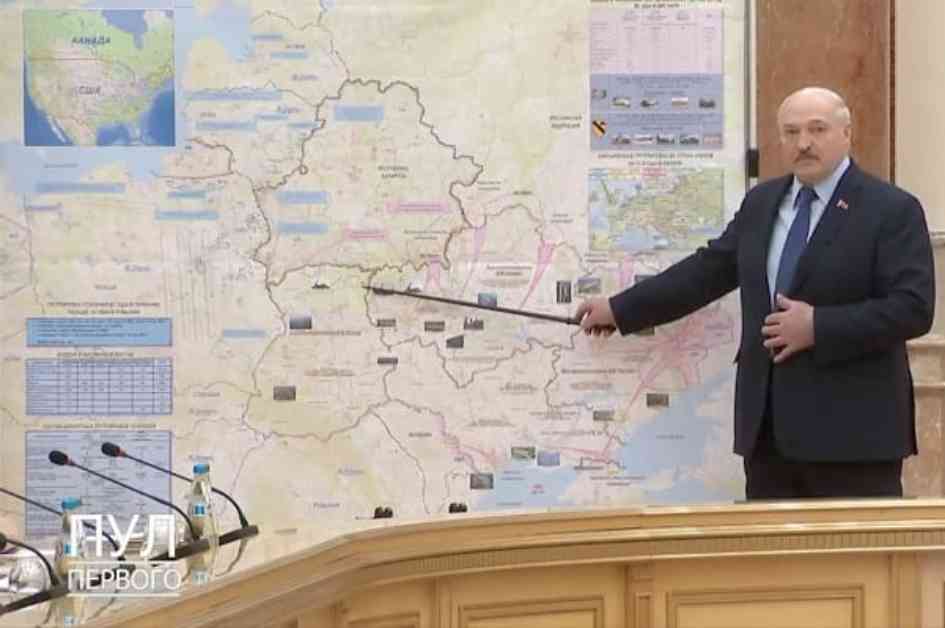Belarus Threatens to Use Nuclear Arms in Response to NATO Attack
The tension between Belarus, Russia, and NATO has reached a critical point, with Belarusian President Alexander Lukashenko issuing a stark warning of potential nuclear retaliation in response to any attack on his country or Russia. This threat comes amidst escalating rhetoric and military posturing in the region, raising concerns about the possibility of a nuclear conflict.
Nuclear Doctrine Tweaked by Russia
In response to the growing threat of conflict in the region, Russian President Vladimir Putin has made significant changes to the country’s nuclear doctrine. Any long-range attacks on Russia by Ukraine using aerospace weapons, including aircraft missiles and UAVs, are now considered grounds for the use of nuclear weapons. This shift in policy reflects Russia’s determination to defend itself against potential threats from its neighboring countries.
Joint Attack Warning
Dmitry Medvedev, the deputy head of the National Security Council in Russia, has also issued a warning that any attack on Russia with the support or participation of a nuclear-weapon country will be considered a joint attack. This stance underscores Russia’s commitment to protecting itself and its allies from external aggression, even if it means resorting to nuclear weapons.
Belarusian President’s Warning
President Lukashenko has not minced words when it comes to defending Belarus against potential threats from NATO. He has made it clear that any attack on his country will be met with a swift and decisive response, including the use of nuclear weapons if necessary. Lukashenko’s warning serves as a stark reminder of the high stakes involved in the escalating tensions between Belarus, Russia, and the Western alliance.
Implications for World War Three
The possibility of a conflict involving nuclear weapons poses a grave threat to global security and stability. NATO’s preparations for a potential confrontation with Russia, coupled with the nuclear doctrines of both Russia and Belarus, raise the specter of a third world war that could have catastrophic consequences for all parties involved. The risk of escalation in the region is real, and the international community must work together to prevent a situation that could spiral out of control.
Russian Military Readiness
Recent reports indicate that Russian nuclear test sites are on high alert and fully prepared for any potential conflict with the West. The apocalyptic explosions at a Russian ammo depot, which forced the evacuation of nearby villages, serve as a chilling reminder of the destructive power of nuclear weapons. The Russian military’s readiness to respond to any provocation underscores the seriousness of the situation and the need for diplomatic efforts to defuse tensions.
Support for Putin’s Nuclear Doctrine
Despite the risks involved, there is strong support for President Putin’s new nuclear doctrine within Russia. A Russian MP has openly endorsed the policy of using nuclear weapons to counter potential threats from Ukraine and Western allies. This stance reflects the prevailing sentiment in Russia that the country must defend itself against external aggression at all costs, even if it means resorting to nuclear force.
NATO’s Response
As NATO draws up plans for a potential conflict with Russia, the alliance faces the challenge of balancing deterrence with diplomacy. The prospect of a military confrontation involving nuclear weapons is a sobering reminder of the need for strategic restraint and dialogue to prevent a catastrophic outcome. NATO’s response to the escalating tensions in the region will be crucial in determining the course of events and the potential for a peaceful resolution.
Conclusion
The escalating tensions between Belarus, Russia, and NATO have brought the specter of nuclear conflict to the forefront of global security concerns. President Lukashenko’s warning of potential nuclear retaliation underscores the high stakes involved in the current crisis and the need for diplomatic efforts to prevent a catastrophic outcome. The international community must work together to defuse tensions, promote dialogue, and prevent a situation that could lead to a third world war. The risks of a nuclear conflict are too great to ignore, and all parties must exercise restraint and prioritize peace in the face of escalating threats.












